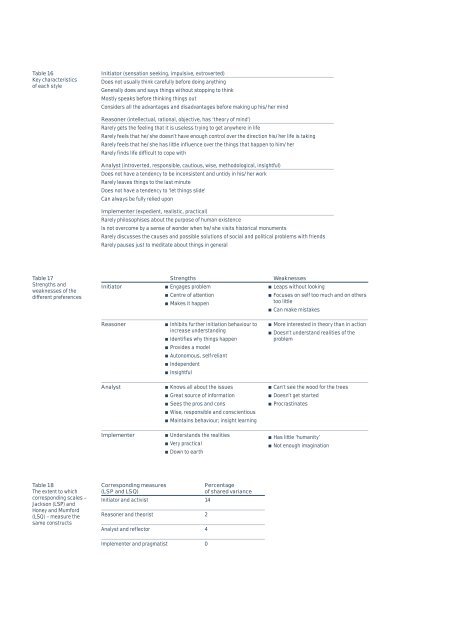learning-styles
learning-styles
learning-styles
Create successful ePaper yourself
Turn your PDF publications into a flip-book with our unique Google optimized e-Paper software.
Table 16<br />
Key characteristics<br />
of each style<br />
Initiator (sensation seeking, impulsive, extroverted)<br />
Does not usually think carefully before doing anything<br />
Generally does and says things without stopping to think<br />
Mostly speaks before thinking things out<br />
Considers all the advantages and disadvantages before making up his/her mind<br />
Reasoner (intellectual, rational, objective, has ‘theory of mind’)<br />
Rarely gets the feeling that it is useless trying to get anywhere in life<br />
Rarely feels that he/she doesn’t have enough control over the direction his/her life is taking<br />
Rarely feels that he/she has little influence over the things that happen to him/her<br />
Rarely finds life difficult to cope with<br />
Analyst (introverted, responsible, cautious, wise, methodological, insightful)<br />
Does not have a tendency to be inconsistent and untidy in his/her work<br />
Rarely leaves things to the last minute<br />
Does not have a tendency to ‘let things slide’<br />
Can always be fully relied upon<br />
Implementer (expedient, realistic, practical)<br />
Rarely philosophises about the purpose of human existence<br />
Is not overcome by a sense of wonder when he/she visits historical monuments<br />
Rarely discusses the causes and possible solutions of social and political problems with friends<br />
Rarely pauses just to meditate about things in general<br />
Table 17<br />
Strengths and<br />
weaknesses of the<br />
different preferences<br />
Initiator<br />
Strengths<br />
Engages problem<br />
Centre of attention<br />
Makes it happen<br />
Weaknesses<br />
Leaps without looking<br />
Focuses on self too much and on others<br />
too little<br />
Can make mistakes<br />
Reasoner<br />
Inhibits further initiation behaviour to<br />
increase understanding<br />
Identifies why things happen<br />
Provides a model<br />
Autonomous, self-reliant<br />
Independent<br />
Insightful<br />
More interested in theory than in action<br />
Doesn’t understand realities of the<br />
problem<br />
Analyst<br />
Knows all about the issues<br />
Great source of information<br />
Sees the pros and cons<br />
Wise, responsible and conscientious<br />
Maintains behaviour; insight <strong>learning</strong><br />
Can’t see the wood for the trees<br />
Doesn’t get started<br />
Procrastinates<br />
Implementer<br />
Understands the realities<br />
Ver y practical<br />
Down to earth<br />
Has little ‘humanity’<br />
Not enough imagination<br />
Table 18<br />
The extent to which<br />
corresponding scales –<br />
Jackson (LSP) and<br />
Honey and Mumford<br />
(LSQ) – measure the<br />
same constructs<br />
Corresponding measures<br />
(LSP and LSQ)<br />
Initiator and activist<br />
Reasoner and theorist<br />
Analyst and reflector<br />
Percentage<br />
of shared variance<br />
14<br />
2<br />
4<br />
Implementer and pragmatist<br />
0


